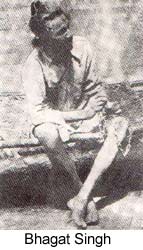

 |  |
 Bhagat Singh and B.K. Dutt were tried in the Assembly Bomb Case. Later
Bhagat Singh, Sukhdev, Rajguru and tens of other revolutionaries were tried in a series of conspiracy cases. Their fearless and defiant attitude in the courts - every day they entered the court-room shouting slogans 'Inquilab Zindabad,' 'Down, Down with Imperialism,' 'Long Live the Proletariat' and singing songs such as 'Sarfaroshi ki tamanna ab hamare dil mein hain' (our heart is filled with the desire for martyrdom) and 'Mera rang de basanti chola' (dye my clothes in saffron colour, the colour of courage and sacrifice) - was reported in newspapers unsurprisingly this won them the support and sympathy of people all over the country including those who had complete faith in non-violence.
Bhagat Singh and B.K. Dutt were tried in the Assembly Bomb Case. Later
Bhagat Singh, Sukhdev, Rajguru and tens of other revolutionaries were tried in a series of conspiracy cases. Their fearless and defiant attitude in the courts - every day they entered the court-room shouting slogans 'Inquilab Zindabad,' 'Down, Down with Imperialism,' 'Long Live the Proletariat' and singing songs such as 'Sarfaroshi ki tamanna ab hamare dil mein hain' (our heart is filled with the desire for martyrdom) and 'Mera rang de basanti chola' (dye my clothes in saffron colour, the colour of courage and sacrifice) - was reported in newspapers unsurprisingly this won them the support and sympathy of people all over the country including those who had complete faith in non-violence. Bhagat Singh became a household name in the land and many persons, all over the country, wept and refused to eat food, attend schools, or carry on their daily work, when they heard of his hanging in March 1931. The country was also stirred by the prolonged hunger strike the revolutionary under-trials undertook as a protest against the horrible conditions in jails. They demanded that they be treated not as criminals but as political prisoners. The entire nation rallied behind the hunger strikers. On 13th September, the 64th day of the epic fast; Jatin Das, frail young man with an iron will, died. Thousands came to pay homage at every station passed by the train carrying his body from Lahore to Calcutta. At Calcutta, a two-mile-long procession of more than six lakh people carried his coffin to the cremation ground. A large number of revolutionaries were convicted in the Lahore conspiracy Case and other similar cases and sentenced to long terms of imprisonment many of them were sent to the Andamans Sukhdev and Rajguru were sentenced to be hanged. The sentence was carried out on 23 March 1931. In Bengal, too, the revolutionary started reorganizing and developing their underground activities. At the same time, many of them continued to work in the Congress organization. This enabled them to gain access to the vast Congress masses; on the other hand, they provided the Congress with an organizational base in small towns and the countryside. They cooperated with C.R. Das in his Swarajist work. After his death, the Congress leadership in Bengal got divided into two wings, one led by Subhash Chandra Bose and the other by J.M. Sengupta, the Yugantar group, join forces with the first and Anushilan with the second. Among the several 'actions' of the reorganized groups was the attempt to assassinate Charles Tegart, the hated Police Commissioner of Calcutta, by Gopinath Saha in January 1924. By an error, another Englishman named Day was killed. The Government came down on the people with a heavy hand. A large number of people, suspected of being terrorists, or their supporters, were arrested under a newly promulgated ordinance. These included Subhash Chandra Bose and many other Congressmen. Saha was hanged despite massive popular protest. The revolutionary activity suffered a severe setback. Among the new 'Revolt Groups', the most active and famous was the Chittagong group led by Surya Sen. next page >> |
Copyright ©2000 indiansaga.info. All rights reserved.
By using this service, you accept that you won't copy or use the data given in this website for any commercial purpose.
The material on indiansaga.info is for informational & educational purpose only.
This site is best viewed at 800 X 600 picture resolution.